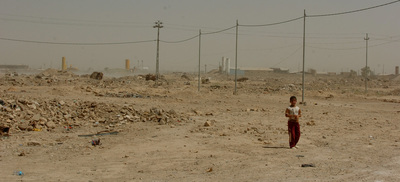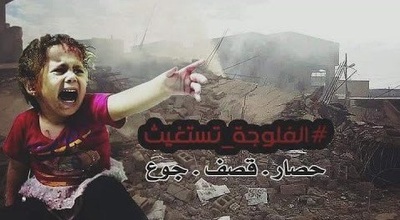The daily propagation of violence by all sides involved has made it impossible for aid to reach Fallujah’s hunger-stricken inhabitants. Death is only one symptom of the crisis; the war is detrimentally affecting sanitary arrangements, water supplies, public health services, and other amenities. Yet the scramble for ministerial posts in the capital, Baghdad, continues to eclipse the reality of recurrent infant deaths, suicide, and abject poverty in occupied Fallujah.
Deputy Director for the Middle East at Human Rights Watch, Joe Stork, called for a cessation of violence to ensure that “aid reaches the civilian population”. Food reserves, as activists told The Diagonal, are fast shrinking, and civilians are reverting to consuming ‘soups’ made of grass. Remaining rations are near impossible for locals to purchase, sold at inflated rates. A sack of 50 kilograms of flour sold for $15 in the capital is sold for $750 in Fallujah, according to HRW. The greatest risk faces infants in the form of malnutrition – and amenorrhea for women – if the food security situation remains unchanged.
The unfolding scenario is no isolated incident. Lisa Grande, head of the United Nations Mission for Iraq, told Al Jazeera that conditions have gone from bad to worse in the past three months. In a report published by the rights group last week, the number of hunger-related deaths was placed at 140 – a tale yet to be widely told. In a press conference held by the Anbar provincial council last week, tribal elders made demands for the siege to be lifted and the army to restore stability to the area.
Comments from HRW come one week after an online campaign under the title ‘Fallujah is Dying of Starvation’ was launched by Iraqi journalist Mohammad Arab. Outraged by the government’s silence, activists have mobilised to humanise those caught in the conflict, and pressurise the international community to call for an end to the ‘political besiegement’ of the city. The hashtag, images and related content of human suffering are all helping the cause to gain traction worldwide.
The Qatar Red Cross Society last Monday launched a three-month campaign with the objective of raising $2,000,000 for displaced families from the wider Anbar province. The stories these families have recounted communicate unspeakable human suffering, for which Iraq’s blinkered politicians have arguably absolved themselves of any responsibility. Utter disregard for human life, as Stark describes, has also been exhibited by IS – using civilians as shields of war to expedite their conquest of Iraq and neighbouring Syria.
Anbar governor Suhaib Al Rawi last month avowed that three exit routes had been opened for civilians to flee, but there has been no evidence to corroborate his claims. Locals have long reported that death is guaranteed for anyone who attempts an escape and is caught by IS terrorists.
Parallels have been drawn between the situation inside Fallujah and that of the Syrian city of Madaya, encircled by Bashar-loyal forces. News of the famine spread like wildfire after distressing images of dying babies broke the net, but the issue of access to Fallujah is still not resolved.
As the world sits back, ordinary people are confronted either by acute malnutrition or outright starvation – with demoralising outcomes for the entire nation. It should not matter that these people are living in lands illegally seized by IS. Lest we forget, the occupiers themselves are treating them as prisoners inside their hometowns. Inattention to their misery serves to render them invisible and inaudible, dimming any enduring hope. They are either starved into submission or killed, while the government overturns its responsibility to protect its people.
Winning the war, as the actions of warring parties depicts, is more favourable than saving lives. Any victory however will take well over a year to secure – and by then the threat of famine will have ravaged the entire city.
Source http://www.the-diagonal.com/2016/04/a-world-inured-to-starvation-in-fallujah/



 RSS Feed
RSS Feed